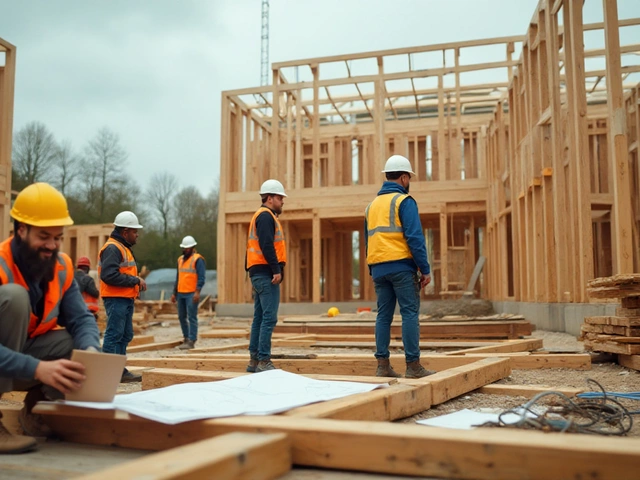The term 'contractor' might seem straightforward at first glance, but dig a bit deeper, and you'll find it's crucial to understand precisely who fits into this role within the construction industry. Contractors are the dynamic orchestrators of building projects, pulling together resources, timelines, and a multitude of skilled tradespeople to bring architectural dreams into reality.
Whether it's constructing a skyscraper or renovating a beloved home, contractors are the go-to experts who ensure everything goes according to plan. If you've ever watched a building rise from its foundations and wondered who holds the strings behind such a feat, this exploration into the world of building contractors might just be your blueprint to understanding their indispensable contribution to construction.
- Defining the Role of a Contractor
- Legal Qualifications and Certifications
- Types of Building Contractors
- Key Responsibilities and Skills
- Choosing the Right Contractor
- Challenges and Considerations in Contracting
Defining the Role of a Contractor
A building contractor is much more than just a person who oversees construction. This role is an integrated part of the construction process, ensuring every project runs smoothly, safely, and within budget. The contractor acts as a linchpin, coordinating various experts—plumbers, electricians, carpenters—and ensuring all moving parts of a project work harmoniously together.
From the moment a project starts until its completion, contractors are responsible for strategizing every phase of the construction process. They review plans, prepare project budgets, and manage timelines. They also obtain necessary permits, ensuring that the project adheres to local building codes and regulations.
Core Responsibilities
One of the key responsibilities of a building contractor is to provide accurate cost estimates for projects—even before a single brick is laid. Their expertise in financial management helps clients understand the financial scope of their projects.
- Project Planning: Contractors lay out detailed project plans, defining scopes, schedules, and phases.
- Team Management: They hire and manage skilled labor, subcontractors, and consultants, ensuring effective communication and coordination.
- Resource Allocation: Contractors source materials, ensuring quality and cost-effectiveness.
- Quality Control: They enforce quality standards throughout the project.
- Compliance and Regulation: Ensuring that all work complies with relevant laws and building codes is crucial.
The Evolution of a Contractor's Role
The contractor's role has evolved with technology. Modern contractors often employ sophisticated project management software to monitor progress, manage resources, and communicate with clients and team members more efficiently. Such software can track everything from time spent on tasks to project milestones, offering real-time data that ensures the project stays on course.
Additionally, contractors might be involved early in the design phase, offering insights that can save money or time. Their practical experience can influence design decisions, ensuring that they are feasible within the project budget and timeline.
In essence, a building contractor is a multitasker extraordinaire, blending a mix of leadership, communication skills, technical knowledge, and financial acumen, ensuring that the intricate clockwork of construction projects ticks smoothly and reliably.
Legal Qualifications and Certifications
In the realm of construction, the legal qualifications and certifications required to become a building contractor are crucial. They not only serve as a marker of expertise and credibility but also as a safeguard for clients against potential incompetency or fraud. Understanding these qualifications can empower clients to make informed decisions and contractors to maintain robust standards in their practice.
Essential Qualifications
Typically, to be recognized as a professional contractor in the United Kingdom, one must first obtain a Construction Skills Certification Scheme (CSCS) card. This card is proof that the holder has the necessary training and qualifications for the job. The CSCS card is almost universally required on construction sites across the UK.
A contractor might also need to complete specific qualifications such as a Diploma in Construction or an advanced apprenticeship in a relevant field. Many contractors also choose to pursue further education, including degrees in construction management or civil engineering, to boost their knowledge and career prospects.
Mandatory Certifications
In addition to qualifications, certain certifications are legally required. Compliance with the Health and Safety Executive (HSE) regulations is mandatory, ensuring all construction projects are conducted safely. This may involve acquiring certification in risk assessment and safety, such as the SMSTS (Site Management Safety Training Scheme) certificate for those managing construction sites.
Moreover, contractors working with specific materials or constructions, such as asbestos, will need specialized training and certification due to the hazardous nature of these materials.
Maintaining Certifications
Once obtained, keeping certifications up to date is critical. Regularly refreshing training courses, staying informed on new health and safety regulations, and updating certifications are necessary to maintain legal eligibility for projects. Continuous professional development is encouraged to adapt to the evolving demands of the construction industry.
Statistical Insight
An interesting figure worth noting is that as of 2023, approximately 75% of construction firms in the UK reported making CSCS cards mandatory for site access, underscoring the importance of this certification.
| Certification | Purpose |
|---|---|
| CSCS Card | Verification of training and qualifications |
| SMSTS | Site management safety |
| Risk Assessment | Health and safety compliance |
By understanding these legal qualifications and certifications, both aspiring contractors and clients can ensure that construction standards are met and projects are executed smoothly and safely.
Types of Building Contractors
In the bustling realm of construction, not all contractors fit the same mold. The realm of building contractors is diverse, catering to various specialties within the overarching universe of construction projects. Understanding these types can be pivotal in ensuring the right expertise is applied to the right job.
General Contractors
Often the face of the project, general contractors are responsible for overseeing a construction endeavor from start to finish. They coordinate the entire workflow by hiring and managing subcontractors, who are specialists in building trades like plumbing, electrical work, or carpentry. Besides managing the schedules and budgets, they ensure that each phase of the work adheres to local building codes and safety regulations.
Specialty Contractors
As the name implies, specialty contractors focus on a particular area of construction work. This can range from roof installations to intricate masonry. Their expertise is invaluable for projects requiring high precision or advanced technical skills that general contractors might not cover in-house.
Design-Build Contractors
Bridging the gap between design and execution, design-build contractors offer both services under one umbrella. This means they take a project from the initial design stage all the way to completion. It's a model that promises streamlined communication and often reduces the overall project timeline. This is especially beneficial for projects with tight deadlines where cohesive vision and execution are paramount.
Pros and Cons of the Design-Build Model
- Pros: Streamlined communication, faster completion times, single-point accountability.
- Cons: Less competitive in cost due to single-source contracting.
Construction Managers
Unlike general contractors who execute construction, construction managers focus more on the project's overall planning and are often involved from the design phase. Their role is crucial in advising on cost estimation, risk management, and project scheduling. They act as a liaison between owners, architects, and subcontractors to keep everything on track, ensuring the project's success without compromising quality.
Owner-Builders
In some instances, the property owner might choose to act as their contractor, particularly for small-scale or low-complexity projects. Known as owner-builders, these individuals take on the responsibility of drafting and submitting plans, acquiring permits, and managing the construction process. While potentially cost-saving, this option requires a profound understanding of construction processes and compliance requirements.
These diverse types of contractors reflect the multifaceted nature of the construction industry. Whether you're embarking on a grand commercial build or a humble remodel, identifying the correct type of contractor is vital for harnessing the right expertise and achieving a seamless project execution.

Key Responsibilities and Skills
When considering who sits at the helm of a successful construction project, the role of a building contractor cannot be overstated. This pivotal responsibility encompasses a vast range of tasks and requires a diverse skill set to ensure that a project not only meets the design briefs but also adheres to regulatory standards and budgets.
Project Management
At the core of a contractor's duties is effective project management. This includes planning the project timeline, coordinating with architects and engineers, and scheduling the various phases of construction. Contractors must manage day-to-day operations, ensuring that each segment progresses as intended without unnecessary delays.
Budgeting and Cost Management
A critical aspect of being a building contractor is managing the financial aspects. Contractors prepare detailed cost estimates, often liaising with suppliers to secure competitive rates for materials and equipment. Maintaining a keen eye on expenditures ensures that the project remains within the allocated budget.
Compliance and Regulatory Adherence
Ensuring that a construction project meets all legal standards and building codes is a non-negotiable responsibility. Contractors must stay informed about the latest regulations, acquiring necessary permits and ensuring all work complies with safety and environmental standards. In some cases, this may involve working directly with legal experts to navigate complex regulatory environments.
Team Leadership and Coordination
Given the complexity of construction projects, contractors must exhibit strong leadership and communication skills. They are responsible for assembling a competent team of skilled laborers and subcontractors. A successful contractor ensures seamless collaboration among all parties involved, promoting a culture where safety and quality are prioritized.
Problem-solving and Adaptability
Construction can be unpredictable, and a successful contractor is adept at navigating challenges swiftly. Whether it's adverse weather conditions affecting construction timelines or unexpected supply chain interruptions, the ability to adapt and find solutions is critical.
Essential Skills in a Contractor's Arsenal
- Technical Know-How: Deep understanding of construction methods and materials.
- Negotiation: Ability to secure favorable terms and prices from suppliers and subcontractors.
- Leadership: Inspiring and guiding teams to achieve project targets safely and efficiently.
- Attention to Detail: Ensuring precision in every aspect of the project, from measurements to finishes.
In summary, a building contractor is a multifaceted professional whose contributions are vital to the success of a construction project. From meticulous planning to on-the-ground leadership, their skills weave together the threads of a myriad of components into a cohesive, functional, and, ultimately, inhabitable structure.
Choosing the Right Contractor
Selecting the right building contractor can be the difference between smooth sailing construction projects and ones riddled with delays and overspending. Making this critical decision requires careful consideration and a keen eye for detail.
Understand Your Project Needs
Before diving into the pool of potential contractors, clearly define the scope and specifications of your project. Whether you’re constructing a new commercial building or doing a home renovation, each project requires a distinct set of skills and resources. Determine the specific services you need: Do you require a general contractor to manage everything, or a specialized contractor focusing on particular tasks?
Check Credentials and Experience
Some of the first questions to ask a prospective construction partner revolve around their credentials. Are they fully licensed and insured? Verify their credentials through local licensing boards and request proof of insurance to protect against any eventualities. Don’t hesitate to delve into their track record – experience is often a reliable indicator of competence. Look for contractors who have successfully completed projects akin to yours. Customer reviews, testimonials, and case studies are invaluable resources in this initial vetting phase.
Get Detailed Bids
Once you’ve shortlisted a few candidates, it's time to request detailed bids. A comprehensive bid should break down costs for labor, materials, and any other project components. This transparency in pricing not only helps you avoid hidden costs but also allows you to understand the financial scope of your project better.
Ask the Right Questions
- What is your timeline for my project?
- How do you handle unexpected challenges or delays?
- Can you provide references from previous clients?
These questions give you insights into their workflow, problem-solving skills, and reliability. Ideally, a dependable contractor will stay aligned with your project’s timeline and manage potential setbacks skillfully.
Communication and Compatibility
Working with a contractor is a partnership. Effective communication is a cornerstone of a successful project. Evaluate how responsive and clear they are during initial interactions. Remember, your contractor should be someone you feel comfortable voicing concerns to and collaborating with - akin to a symphony where every musician plays in harmony.
Trust Your Instincts
Despite all the data and facts, intuition plays a role too. If something doesn’t feel right or if there’s a disconnect in communication, it might be wise to explore other options. Trust is integral, and your gut feeling can often guide you toward a contractor who aligns with your expectations and values.
The choice of the right contractor may seem daunting, but with careful groundwork and attention to detail, you can secure a knowledgeable partner who can bring your construction vision to fruition.
Challenges and Considerations in Contracting
In the realm of the construction industry, being a building contractor comes with its own set of challenges and crucial considerations. This sector is fraught with unpredictable elements and potential pitfalls that require a contractor to be both vigilant and versatile. It is not just about laying bricks; it is about coordinating myriad components to form a cohesive, functional structure, all while keeping a watchful eye on external influences that can affect the timeline and budget.
Managing Expectations and Relationships
One of the primary challenges contractors face is managing client expectations. Clients often envision grand outcomes, and it is the contractor’s job to temper these aspirations with realism. Building a sustainable relationship with clients requires transparent communication from project inception to completion. Miscommunications can lead to disputes or dissatisfaction, which may have long-term impacts on a contractor's reputation.
Legal and Regulatory Challenges
The construction industry is one of the most regulated sectors worldwide. Navigating the labyrinth of building codes, health and safety regulations, and environmental laws can be daunting. Contractors must stay informed and compliant to avoid costly legal battles or project halts. Failure to adhere to regulations not only poses legal risks but can also endanger workers and the public.
The Financial Jigsaw
Financial management is a cornerstone of contracting success. Projects must be carefully budgeted, with considerations for unforeseen expenditures. Price fluctuations in raw materials can wreak havoc on predefined budgets, necessitating flexibility and contingency planning. Contractors need to maintain a steady cash flow while ensuring prompt payments to subcontractors and suppliers to keep the project momentum unhampered.
Risk Management
From weather disruptions to labor shortages, multiple risks can threaten a project's timeline and success. Effective risk assessment and management are essential. Contractors must proactively identify potential risks and employ strategies to mitigate them, ensuring that projects proceed without unnecessary delays or threats to worker safety.
The Importance of Skilled Labor
As the industry evolves, there's a growing demand for skilled labor, and finding the right talent is crucial. Contractors must balance hiring experienced workers with bringing in fresh talent who can learn on the job. This balance ensures that while projects remain on the cutting edge of innovation, they also benefit from the wisdom of tried-and-true approaches.
Despite the challenges, being a building contractor can be incredibly rewarding. Navigating through these complexities not only provides a sense of accomplishment but also contributes to the creation of structures that shape communities. Through diligence, foresight, and adaptability, contractors lead projects from mere blueprints to tangible reality.





